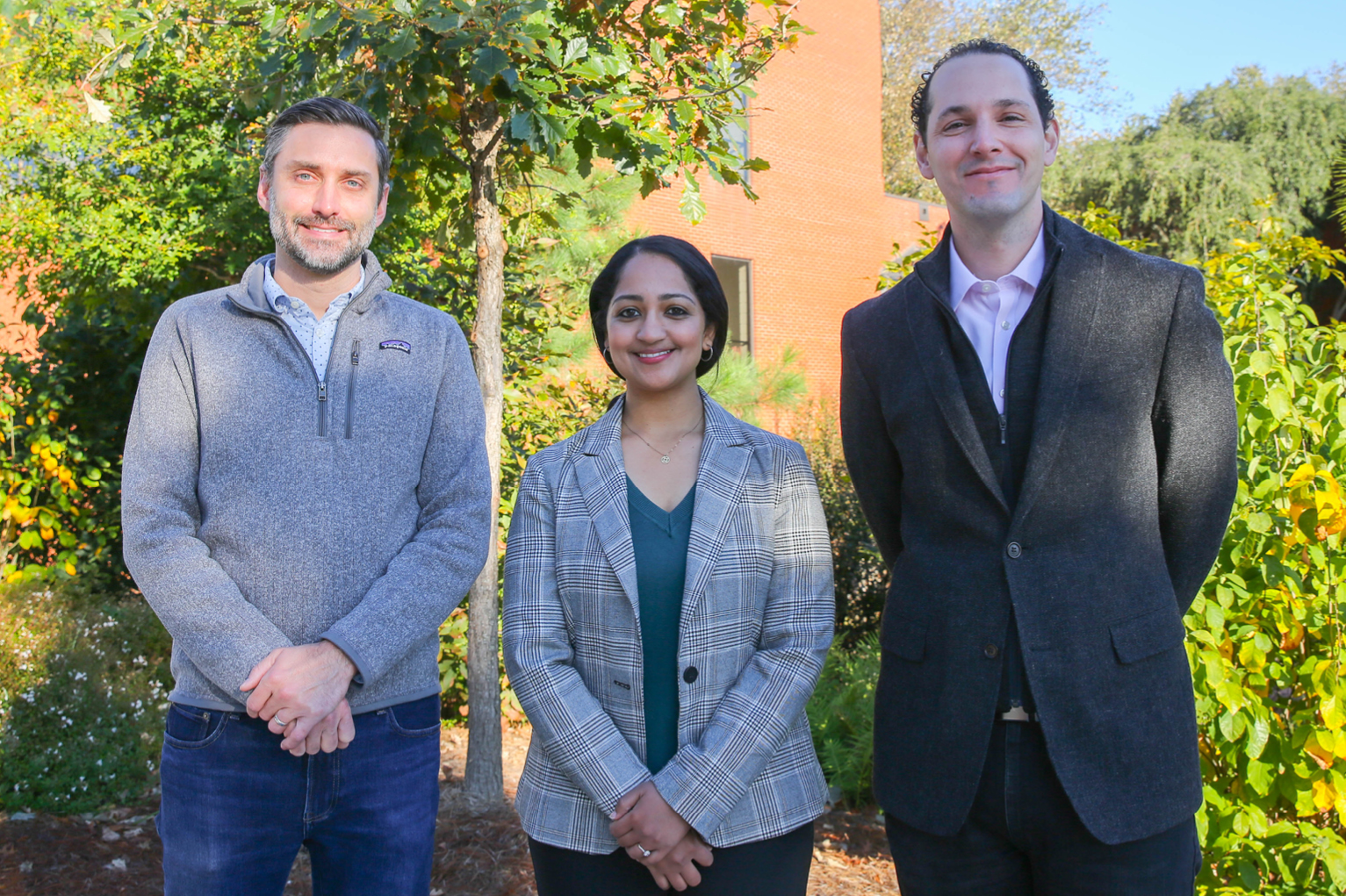
Pictured left to right: Associate Professor Matthew McDowell (ME), Assistant Professor Akanksha Menon (ME), and Assistant Professor Claudio Di Leo (AE).
Assistant Professor Akanksha Menon Awarded $3 Million for Research as part of DOE's Energy Earthshots™ Initiative
Menon and her team will address two Energy Earthshots™ to help achieve net-zero carbon by 2050, combat climate crisis.
October 18, 2023
By Chloe Arrington
Akanksha Menon, assistant professor in the George W. Woodruff School of Mechanical Engineering, has been awarded $3 million in funding from the Department of Energy (DOE) as part of their Energy Earthshots™ Initiative to advance clean energy technologies within the decade.
The initiative includes a total of $264 million in funding that will support 11 new Energy Earthshot Research Centers (EERCs) led by DOE National Laboratories and 18 university research teams addressing one or more of the specific Energy Earthshots™ that aim to accelerate affordable and reliable clean energy solutions to mitigate the climate crisis to reach a net-zero carbon goal in 2050.
Menon's project, titled Thermo-Chemo-Mechanical Transformations in Thermal Energy Storage Materials and Composites, will bring together Matthew McDowell, associate professor in the Woodruff School, Claudio Di Leo, assistant professor in the Daniel Guggenheim School of Aerospace Engineering, and Jeff Urban from the Lawrence Berkeley National Laboratory, to provide a fundamental understanding of the coupled thermo-chemo-mechanical phenomena in thermal energy storage (TES) materials that will enable low-cost and stable storage.
“You can think of TES as a thermal battery that is ‘charged’ using electricity and can ‘discharge’ that energy as heat at different temperatures ranging from 100 to 1500 degrees Celsius,” said Menon.
An issue Menon explained is that during this charge and discharge process, materials experience large thermal and concentration gradients that can cause structural changes and mechanical stresses. This in turn impacts the storage capacity and lifetime of the materials.
To address this, the research team will combine experiments with predictive computational models to pinpoint the rational design of composite TES materials that are stable under cycling using tools developed for studying Li-ion batteries, with modifications for gas flow and different temperature ranges.
The collaboration will draw on the specialized skills of those involved. “My co-PI, Matthew McDowell, is an expert in developing in situ experimentation of battery materials,” stated Menon. In addition, co-PI Di Leo will provide expertise in continuum modeling of coupled interactions in dynamic materials that will aid the development of a general framework for understanding the degradation in TES composites. The Molecular Foundry, a nanoscience research facility within Berkeley Lab, will be used to synthesize composite materials that minimize mechanical degradation and maximize energy storage.
Menon highlighted how one of the benefits of a thermal battery, over electrochemical batteries like Li-ion, is that energy storage capacity and power output can be dissociated, making it suitable for achieving the Long Duration Storage Shot™, which is targeting low-cost storage for 10+ hours.
The thermal battery can also produce heat at different temperatures by using different materials and storage mechanisms (such as thermochemical reactions and sensible heat), making this suitable for achieving the Industrial Heat Shot™, which is targeting low-carbon heat for industrial processes like iron and steel production.
Menon used the comparison of an everyday cell phone battery to explain the goal of the project. “If you think about it, we don’t know everything about the Li-ion batteries in our phones,” she said. “However, enough research has been done to pinpoint how many cycles and how much performance degradation is typical over a given lifetime – that is the level of detail our project aims to bring to the field of thermal batteries.”
This grant builds on Menon’s NSF CAREER Award which started earlier this year and will also contribute to another DOE-funded project she is leading on integrating thermochemical energy storage with HVAC in buildings, which has a planned start date of next year.
“I was one of the topic leads back in February when the Strategic Energy Institute (SEI) organized an informational workshop on this topic, so now having a $3 million funded project is surreal. We have a lot of work to do to make thermal batteries a reality,” said Menon.
Menon is also a part of an EERC led by the National Renewable Energy Laboratory (NREL), along with Associate Professor Shannon Yee.
Other members of the Georgia Tech community have also been awarded funding as part of the DOE's initiative:
Professor David Sholl Leading New Energy Earthshot Research Center to Stem Climate Change
